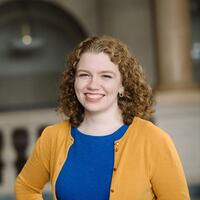“LifeWise is the first program of its kind offered at the Northridge Local Schools. We look at any program that is brought to our attention and consider its benefits for students/families before deciding whether or not to offer it,” he said. “It is a character education program that any and all students can access regardless of race, religion, etc.”
Questions of religion and public schools have been in the public eye recently, in the wake of the U.S. Supreme Court’s Kennedy v. Bremerton School District ruling in June. That ruling protected a public school football coach who kneeled and prayed on the field after games, often surrounded by team players. The Northridge program is not connected to that ruling.
Courtney Wilson, director of the group LifeWise Academy Northridge, who is running the local Bible studies class, said the classes are typically scheduled for once a week, like any other “special” class, like gym or music.
“Typically students attend LifeWise class once a week for one class period,” Wilson said.
Jackson said the program, which is Bible-based, is open to all Northridge students, not just Christian students. He said there is not a similar program through Northridge sponsored by a Jewish or Islamic religious organization.
Programs like these are called “released time,” referring to a 1952 Supreme Court case, Zorach v. Clauson, where the Supreme Court ruled programs that released students during school hours, on written request of their parents, to participate in religious instruction not on school grounds was not against the First Amendment, which in part guarantees the freedom of religion.
Under Ohio law, programs like these cannot use any public funds, cannot use public school personnel to teach the classes, cannot put the classes on school grounds, and put the burden of transportation and opting into these classes on the parent and student.
The Northridge school board voted unanimously at their April meeting to approve the class, according to meeting minutes.
Wilson said this program is available through New City Church and Stillwater United Methodist Church. She said the program is privately funded and doesn’t require money from the parents or the school.
Covington Local Schools’ incoming Superintendent Joe Hoelzle said the district has been approached by a group interested in adding the program to Covington schools. The school board has considered it, but the district is still discussing the idea.
Hoelzle said a 2004 policy allowed such a program in that district, and it’s very likely it would be added to the district.
Troy Superintendent Chris Piper said his district has been approached about opening a program.
“Our board had some brief discussion about it at one board work session,” Piper said. “I believe it was also brought up by a citizen during public comments at a later meeting. It is not scheduled for any additional discussion at this time.”
Brittni Hurtig, a spokesman for LifeWise, said the organization served more than 36 schools last year and will serve more than 100 this upcoming school year.
“We are excited to see so many Ohio communities launching LifeWise Academy programs this fall,” said Joel Penton, Founder of LifeWise Academy. “LifeWise gives parents and students the opportunity to incorporate an optional, weekly Bible-based character education class into their week.”
LifeWise Academy is part of Stand For Truth, a nonprofit Christian ministry that aims to reach public school students who don’t attend church. According to its website, the organization was founded in 2018 and inspired by a program out of Van Wert, which is in northwest Ohio close to the Indiana border.
A March 2021 Lima News story said 90% of Van Wert Elementary students participate in the LifeWise program, with the other students staying in their classroom with their teacher for that time.
Jackson said Northridge students who elect to participate “will not miss any core content classes” during the LifeWise period plus transportation time. He said they could miss a gym or music class on a rotating basis.
LifeWise’s website says it is self-funded through donations. Volunteers are needed to walk with the students to the churches or drive a van. These programs can be run for between $100 to $300 per student per year, depending on decisions made by the local organization, according to the website.
Currently this program is available for students in grades 1-5 only. Wilson said the churches intend to make this program available to all grades in the future.
About the Author


